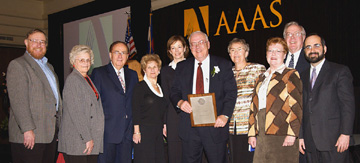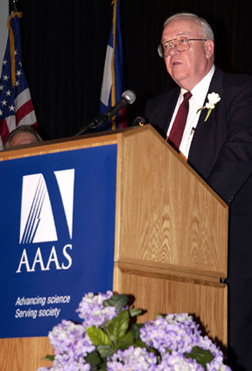 |
The University of Nebraska contingency at Sunday’s ceremony included: from left to right: UNMC’s William Berndt, Ph.D., and wife Bonnie; UNMC Chancellor Harold M. Maurer, M.D., and wife Beverly; NU’s Kim Robak; NU President L. Dennis Smith, Ph.D., and wife Suzanne; NU Regent Don Blank, D.D.S., and wife Jan; and UNMC’s Howard Gendelman, M.D. Photo courtesy of PRO-PIX. |
The award honors scientists and engineers whose exemplary actions, often taken at significant personal cost, have served to foster scientific freedom and responsibility.
Defending scientific research
Dr. Smith demonstrated such steadfast support in 1999, when medical research being conducted at UNMC came under fire. The research, designed to shed light on neurodegenerative diseases such as Alzheimer’s, Parkinson’s, AIDS dementia and multiple sclerosis, relied on fetal tissue. State policymakers and religious leaders warned against using public funds for this research, and a bill was introduced in the legislature to ban the use of such tissue.
 |
NU President L. Dennis Smith accepts the AAAS award. Photo courtesy of PRO-PIX. |
“Truly deserving”
“President Smith is truly deserving of this prestigious award,” UNMC Chancellor Harold M. Maurer, M.D., said when the award was first announced. “Through his strong leadership and example he set the tone for all biomedical research on this campus. We should all take personal pride in his award and salute his courage. With his encouragement we continue our efforts to find new treatments and cures for a variety of diseases.”
Dr. Smith also created the Nebraska Bioethics Advisory Commission, composed of a wide cross section of scientists and lay people, to develop guidelines for the ethical conduct of future biomedical research at the University of Nebraska.
“The ability to undertake legitimate research without external interference, including that from political and religious sectors, is fundamental to the excellence of our postsecondary institutions,” Dr. Smith has said.
Science background
Dr. Smith became president of the University of Nebraska March 1, 1994. Previously, he served as executive vice chancellor of the University of California at Irvine (1990-1994), and earlier, served on the faculty at Purdue University. He earned his Ph.D. in 1964 in experimental embryology, and his bachelor’s degree in 1959 in zoology and chemistry, from Indiana University. His studies some 30 years ago of cell division in frogs helped lay the groundwork for three researchers who ultimately won a Nobel Prize in medicine for identifying the entire cycle of a cell.